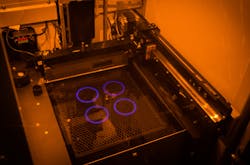So That Happened: 3D-Printed Food? Shingo Prizes for Writers, EV Financing Churn
Editor’s note: Welcome to So That Happened, our editors’ takes on things going on in the manufacturing world that deserve some extra attention. This will appear regularly in the Member’s Only section of the site.
Party at Katie’s House
Big congratulations to leadership coach, author and IndustryWeek contributor Katie Anderson. The Fulbright scholar, former healthcare executive, mom of two boys and lover of Japanese Daruma dolls (read her bio for more on those) is a recipient of the 2023 Shingo Publication Award for her book "Learning to Lead, Leading to Learn: Lessons from Toyota Leader Isao Yoshino on a Lifetime of Continuous Learning.”
The Shingo award recognizes thought leadership that has had “a significant impact and advances the body of knowledge regarding organizational excellence.” It’s administered each year by the Shingo Institute of the Jon M. Huntsman School of Business at Utah State University.
In the book, Anderson covers the leadership lessons she’s learned from Yoshino—a revered teacher who helped develop much of Toyota’s shop-floor training culture—and illuminates them with her own insights on becoming better leaders and learners. She calls working with Yoshino “one of my life’s greatest privileges.” In addition to reading Anderson’s book, check out her recent IndustryWeek column here.
And, you can join us next Thursday, July 20, at noon (eastern) when Anderson will be the guest of IndustryWeek’s bi-weekly Production Pulse livestream show.
Machinists of Merit
Open to women of all skill levels working with their technology, ANCA has announced the launch of its Female Machinist Award. The winner will be chosen by a panel of professionals in the tool and cutter grinding industry based on a number of criteria, including problem-solving skills, effective tool design and innovation abilities.
“Recognizing and celebrating the contributions of women in the tool and cutter grinding industry is a vital step towards unlocking the industry’s true potential. By embracing and empowering women, we discover a wealth of diverse perspectives, fresh ideas, and extraordinary talent,” says Johanna Boland, ANCA group strategy & communications manager.
The prize for the winner is a ticket to attend a trade show where the company is exhibiting, along with opportunities to be part of educational workshops, networking opportunities and access to the ANCA team of leaders, engineers and experts.
“ANCA is committed to shining a spotlight on these remarkable individuals, because we believe that their success fuels the success of our industry as a whole,” Boland says. The manufacturer of CNC grinding machines is accepting applications for the inaugural award on their website.
Another Investor Pulls the EV Startup Plug
Early last week electric commercial van maker Arrival and Kensington Capital terminated their business combination agreement. The partnership lasted a whopping…three months.
The split means Arrival will not get a sorely needed $283 million as it continues an impressive cash burn as it struggles to produce its Class 4 delivery van. It ended its first quarter with $130 million left, compared to $205 million at the start.
Guess fleeing the UK and laying off half of its work force in the process didn’t help much? Added to the fact that the firm is yet to deliver a single vehicle (although it is in the production verification process) and has repeatedly delayed beginning production of its van in Charlotte (currently slated for some time in 2024, two years after the original “late 2022” start date) and the picture doesn’t look too pretty.
The company has hired TD Cowen and Teneo Financial Advisory to help find alternative funding. But if that doesn’t work, well, Lordstown, move over. There might be a new bankrupt EV company dominating the news cycle.
Canoo to Expand DoD Partnership
It’s not all glum news in the EV world. Canoo, makers of the funny looking, pill-shaped electric van, is expanding its technology development program with the Department of Defense, furthering the DoD’s JABS program goal of using commercial EV technology for the military.
The partnership began in February when the start-up was selected to supply battery modules for analysis and demonstration.
Canoo’s proprietary battery system can be paired with cells from different battery providers and capable of adapting for future technological advancements. Prior to the partnership, the company delivered a Light Tactical Vehicle to the U.S. Army in November 2022. The vehicle, like the battery system, is highly configurable and can be used as a pickup, a convertible flatbed or a cargo vehicle.
The updated partnership calls for Canoo to deliver a “technologically advanced battery pack that can be scaled for use on operational military platforms” and will lead to standardization of energy dense lithium batteries in the U.S. Navy.
The military Jumpstart for Advanced Battery Standardization (JABS) program hopes to advance “form-fit-function battery standards for defense” by using existing commercial EV technology in a military setting.
The battery modules are manufactured at its new facility at MidAmerica Industrial Park in Pryor, Oklahoma, where it will create over 200 jobs.
Where’s my 3D-Printed Chicken Sandwich?
3D HUBS, an on-demand additive manufacturing company owned by Protolabs, earlier this month released its 3D Printing Trend Report 2023. According to the report, 71% of businesses 3D-printed more parts in 2022 than in 2021 and 83% of respondents believe 3D printing helped them save substantial costs in their manufacturing pipeline.
Most of the report contains few surprises. Polymer-based additive manufacturing methods are most popular, prototyping is by far the most common industrial use of the technology and 75% of all additive production runs were less than 100 parts.
Tooling production, something we talked about in our story on General Motors’ approach to additive technology, was cited as an application by only 6% of respondents. I wish that number was higher. I think manufacture of custom tooling is one of the most interesting uses of 3D printing, especially when it comes to immediate value.
The report also discusses the industries pushing 3D printing forward and one of the five mentioned is food. Research into 3D printing human organs has come up a few times during interviews with additive manufacturing experts but never the idea of 3D printing food. Both of them feel more futuristic to me than any industrial use of additive manufacturing, even at scale.
About the Author

Laura Putre
Senior Editor, IndustryWeek
As senior editor, Laura Putre works with IndustryWeek's editorial contributors and reports on leadership and the automotive industry as they relate to manufacturing. She joined IndustryWeek in 2015 as a staff writer covering workforce issues.
Prior to IndustryWeek, Laura reported on the healthcare industry and covered local news. She was the editor of the Chicago Journal and a staff writer for Cleveland Scene. Her national bylines include The Guardian, Slate, Pacific-Standard and The Root.
Laura was a National Press Foundation fellow in 2022.
Got a story idea? Reach out to Laura at [email protected]
Anna Smith
News Editor
News Editor
LinkedIn: https://www.linkedin.com/in/anna-m-smith/
Bio: Anna Smith joined IndustryWeek in 2021. She handles IW’s daily newsletters and breaking news of interest to the manufacturing industry. Anna was previously an editorial assistant at New Equipment Digest, Material Handling & Logistics and other publications.
Geert De Lombaerde
Senior Editor
A native of Belgium, Geert De Lombaerde has been in business journalism since the mid-1990s and writes about public companies, markets and economic trends for Endeavor Business Media publications, focusing on IndustryWeek, FleetOwner, Oil & Gas Journal, T&D World and Healthcare Innovation. He also curates the twice-monthly Market Moves Strategy newsletter that showcases Endeavor stories on strategy, leadership and investment and contributes to other Market Moves newsletters.
With a degree in journalism from the University of Missouri, he began his reporting career at the Business Courier in Cincinnati in 1997, initially covering retail and the courts before shifting to banking, insurance and investing. He later was managing editor and editor of the Nashville Business Journal before being named editor of the Nashville Post in early 2008. He led a team that helped grow the Post's online traffic more than fivefold before joining Endeavor in September 2021.
Dennis Scimeca
Dennis Scimeca is a veteran technology journalist with particular experience in vision system technology, machine learning/artificial intelligence, and augmented/mixed/virtual reality (XR), with bylines in consumer, developer, and B2B outlets.
At IndustryWeek, he covers the competitive advantages gained by manufacturers that deploy proven technologies. If you would like to share your story with IndustryWeek, please contact Dennis at [email protected].


